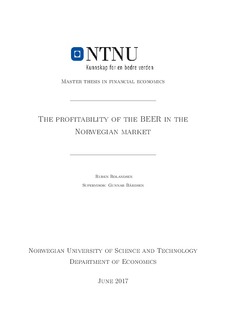| dc.description.abstract | The thesis sets out to examine if the properties of the Bond Equity Earnings Yield ratio (BEER), and the Norwegian economy’s relation to the oil market, in combination with a suitable econometric model, can be used to derive a trading rules for guiding investment decisions. The empirical modeling of the bond equity earnings ratio leads to the definition of two sets of trading rules. The first trading on the realizations of the oil price over 3 month period. The second bases investment decisions on a derived econometric model forecasting the directions of the BEER-series. The accumulated returns of following both strategies are then compared to a passive buy-and-hold strategy holding the wide market index (OSEBX). The paper finds that both trading rules generate a higher level of accumulated return, compared to the benchmark index, over the sample period from 1997 to the end of 2016.
The success can both be attributed to the non-linear LSTR model that determines the threshold values of oil price changes that are then used to make investment decisions, and the linear specification that provide forecasts of the BEER movements of which are traded on. It is however important to emphasize that trading on the changes in the oil price alone and the forecasted values of the BEER, do not categorically produce higher excess return to risk performances when compared to the benchmark index, and does come with a higher level of risk.
The higher level of accumulated return found in the paper is in alignment with some of the some of the previous research of the BEER, raising the concern for market efficiency. The paper wishes to provide an indication for whether of not the market is efficient, using a modified version of the CAPM. On the basis of these results, the authors view is that the returns generated from following both strategies are not sufficient to disprove the hypothesis of weak market efficiency. It is important to emphasize that the examination of market efficiency is limited, and should not be taken as an definitive result. | nb_NO |
